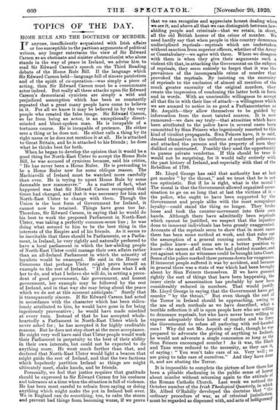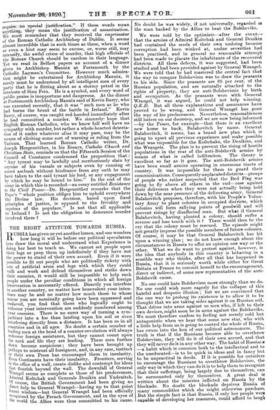TOPICS OF THE DAY.
HOME RULE AND THE DOCTRINE OF MURDER.
TF anyone, insufficiently acquainted with Irish affairs or too susceptible to -the partisan arguments of political writers, any longer entertains the view of Sir Edward Carson as an obstinate and sinister obstructionist who alone stands in the way of peace in Ireland, we advise him to read Sir Edward Carson's speech on the Third Reading debate of the Home Rule Bill. If the language which Sir Edward Carson held—language full of sincere patriotism and of the spirit of co-operation—was simply a piece of acting, then Sir Edward Carson must be a consummate actor indeed. But really all these attacks upon Sir Edward Carson's demoniacal cynicism are simply a wild and prejudiced assumption which has been so constantly repeated that a great many people have come to believe in it. For all we know it may be believed in by the very people who created the false image. Sir Edward Carson, so far from being an -actor, is an exceptionally direct- minded and blunt-spoken man. He is incapable of a tortuous course. He is incapable of pretence. He either sees a thing or he does not. He either calls a thing by its right name or he does not mention it at all. He is attached to Great Britain, and he is attached to his friends ; he does what he thinks best for both.
When he began to develop the opinion that it would be a good thing for North-East Ulster to accept the Home Rule Bill, he was accused of cynicism because, said his critics, "He has never been a Home Ruler. He is pretending to he a Home Ruler now for some oblique reason. The Machiavelli of Ireland must be watched more carefully than ever. He is trying to upset Home Rule by some damnable new manoeuvre." As a matter of fact, what happened was that Sir Edward Carson recognized that times had changed, and that it was necessary for him and North-East Ulster to change with them. Though the Union is the best form of Government for Ireland, it cannot now be retained. Things have gone too far. Therefore, Sir Edward Carson, in saying that he would do his best to work the proposed Parliament in North7East Ulster, was taking a perfectly common-sense line ; he was doing what seemed to him to be the best thing in the interests of the Empire and of his friends. As it seems to be inevitable that there should be Parliaments, or a Parlia- ment, in Ireland, he very rightly and naturally preferred to have a local parliament in which the law-abiding people of North-East Ulster could manage their own affairs rather than an all-Ireland Parliament in which the minority of loyalists would be swamped. He said in the House of Commons that perhaps Ulster might prove herself an example to the rest of Ireland. "If she does what I ask her to do, and what I believe she will do, in setting a prece- dent of good government, fair government, and honest government, her example may be followed by the rest of Ireland, and in that way she may bring about the peace which we do not at this moment anticipate." Surely that is transparently sincere. If Sir Edward Carson had acted in accordance with the character which has been ridicu- lously attributed to him, he would have gone in for being ingeniously provocative ; he would have made mischief at every turn. Instead of that he has accepted whole- heartedly a Parliament in North-East Ulster which he never asked for ; he has accepted it for highly creditable reasons. But he does not stop short at the mere acceptance. He might very well have said that Ulster people would work their Parliament in perpetuity to the best of their ability in their own interests, but could not be expected to do anything more. He• went much further than that, and declared that North-East Ulster would light a beacon that might guide the rest of Ireland, and that the two factions which hopelessly partition Ireland- as things are might ultimately meet, shake hands, and be friends.
Personally, we feel that justice requires- that gratitude should be expressed to Sir Edward Carson for his coolness and tolerance at a time when the situation is full of violence.
He has been most careful to refrain from saying or doing anything which might make the pot in Ireland boil over. We in England can do something, too, to calm the storm and prevent bid things from becoming worse, if we prove that we can recognize and appreciate honest dealing when we see it, and above all that we can distinguish between law- abiding people and criminals—that we retain, in short, all- the old. British horror of the crime of murder. We need hardly say that when people in this country denounce undisciplined reprisals—reprisals which are undertaken without sanction from superior officers, whether of the Army or Constabulary—we agree with them. Where we disagree with them is when they give their arguments such a violent tilt that, in attacking the Government on the subject of reprisals, they seem entirely to forget that it was the prevalence of the incomparable crime of murder that provoked the reprisals. By insisting on the enormity of reprisals to the exclusion of almost all mention of the much greater enormity of the original murders, they create the impression of condoning the latter both in form and in words. With an unscientific willingness to accept all that fits in with their line of attack—a willingness which we are amazed to notice in so good a Parliamentarian as Mr. Asquith—they allow themselves to be guided by information from the most tainted sources. It is now rumoured—we dare say truly—that atrocities which have been attributed to the police have in several cases been committed by Sinn Feiners who ingeniously resorted to this kind of virulent propaganda. Sinn Feiners have, it is said, dressed themselves in the uniforms of murdered policemen and attacked the persons and the property of men they disliked or mistrusted. Possibly they used the opportunity to pursue private vendettas. If this should be true it would not be surprising, for it would tally entirely with the past history of Ireland, and especially with that of the Rebellion of 1798.
Mr. Lloyd George has said. that authority has at last got murder "by the throat," and we trust that he is not too optimistic. But if he is right, what is the moral ? The moral is that the Government allowed organized assas- sination to go on so long that at last the victims of it— the police, who ought to have been supported by the Government and people alike with the most scrupulous loyalty—could stand the thing no longer. They broke loose and. took the counter-movement into their own hands. Although there have admittedly been reprisals which cannot be justified, we suspect that the injustice done to innocent individuals has been grossly exaggerated. Accounts of the reprisals seem to show that in most cases there has been some method at work, and that rules out the assumption of a general running amuck. Probably the police knew--and none are in a better position to know—the names of all those who had plotted murder, and yet against whom no witnesses could be brought into Court. Some of the police marked these persons down for vengeance. If innocent people suffered it was by accident, and because in general there was a state of war which had been brought about by Sinn Feiners themselves. If we have guessed rightly the sort of things that have been happening, the inner circle of assassination has probably by now been considerably reduced in numbers. That would justify Mr. Lloyd George in saying that the Government have got murder "by the throat." But even though the end of the Terror in Ireland should be approaching, owing to the use of such methods as we have described, what a terrible reflection it all is upon people here who are willing to denounce reprisals, but who have never been willing to express adequately their horror of murder and to force the Government to refuse all parleying. with red-handed men! Why did not Mr. Asquith say that, though he vas prepared to advocate the giving of anything to Ireland, he would not advocate a single concession so long as the Sinn Feiners encouraged murder ? As it was, the B10' and Tans were reduced to the necessity, as they 88S 14 of saying : "You won't take care of us. Very well ; we are going to take care of ourselves." And they have done it, and are abating the Terror.
It is impossible to complete the picture of how there has been a pitiable slackening in the public sense of horror, about murder without returning again to the attitude el the Roman Catholic Church. Last week we noticed the October number of the Irish Theological Quarterly, in ivecli Mr. Alfred O'Rahilly - developed the doctrine that .th° ordinary procedure of war, as of criminal jurisd. must be'regarded as diripenfied with, and acts of belhgereno9 require: no 'special justification." If these words mean anything, -they mean the justification of assassination. We must remember that they received the imprimatur of the Roman Catholic Archbishop of Dublin. It seems almost incredible that in such times as these, when a word or even a hint may seem to excuse, or, worse still, may intensify, the awful crime of murder, that high officials of the Roman Church should be careless in their language. Yet we read in Belfast papers an account of a dinner given to Archbishop Mannix' at Portsmouth by the Catholic Laymen's . Committee. However much admira- tion might be entertained for Archbishop Mannix, it surely must be understood by all intelligent men of every party that he is flitting about as a stormy petrel in the interests of Sinn Fein. He is a symbol, and every word of public praise is inopportune and dangerous. At the dinner at Portsmouth Archbishop Mannix said of Kevin Barry, who was executed recently, that it was "such men as he who had borne the brunt of the battle in Ireland." Kevin Barry, of course, was caught red-handed immediately after he had committed a murder. We sincerely hope that English Roman Catholics, who we know full well have no sympathy with murder, but rather a whole-hearted detesta- tion of it under whatever alias it may pass, may be the means of eliciting some sort of warning or ruling from the Vatican. That learned Roman Catholic writer, Dr. Joseph Hergenrather, in his Essays, Catholic Church and Christian State, reminds us that the Fifteenth Session of the Council of Constance condemned the proposition that : "Any tyrant may be lawfully and meritoriously slain by anyone of his vassals or subjects even by cunning or secret ambush without hindrance from any oath he may have taken to the said tyrant his lord, or any engagement by which he may be bound to him." In the end of the essay in which this is recorded—an essay entitled Resistance to the Civil Power—Dr. Hergenrother remarks that the Pope's "whole position obliges him to uphold everywhere the Divine law. His decision, based upon fixed principles of justice, is opposed to the frivolity and caprices of the populace.' Is not that all applicable to Ireland ? Is not the obligation to denounce murder involved there ?



































 Previous page
Previous page